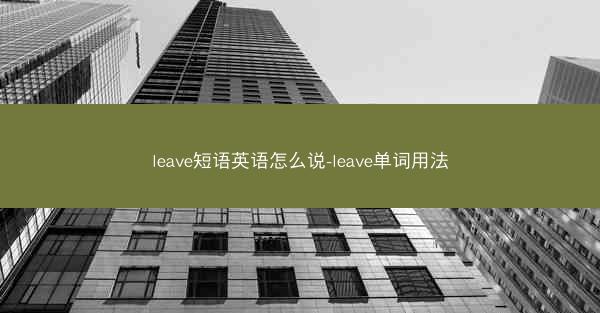
The word leave in English is a versatile and commonly used term that can refer to various actions and meanings. It can be a verb, a noun, or an adjective, and its usage varies depending on the context. Understanding the different ways leave can be used is essential for effective communication in both written and spoken English.
As a Verb
1. To Go Away: The most basic usage of leave is to indicate the act of going away or departing from a place. For example, I will leave for the airport at 5 PM.\
2. To Allow or Permit: Leave can also mean to allow something to happen or to permit an action. For instance, You can leave the door unlocked.\
3. To Leave Behind: This usage implies leaving something behind when going away. An example would be, Don't forget to leave your keys on the table.\
4. To Leave Someone: This phrase means to leave a person, often in a metaphorical sense. For example, I feel like I've been left out of the conversation.\
5. To Leave Work: When referring to employment, leave can mean taking time off from work. I'm taking a week's leave to travel.\
As a Noun
1. Permission to Be Absent: Leave as a noun can refer to the permission granted to be absent from work or school. For example, He has requested a leave of absence.\
2. The Act of Departing: It can also mean the act of departing from a place. The train has departed, and we have missed our leave.\
3. A Quantity of Something Left: In some contexts, leave can refer to a quantity of something that remains. There's only a little leave in the pot, so we should use it sparingly.\
As an Adjective
1. Left Over: Leave as an adjective is often used to describe something that is left over after the main part has been used or consumed. We have some leave cake from the party.\
Phrasal Verbs Involving Leave
1. Leave Behind: This phrasal verb means to forget to take something with you when you leave a place. Don't leave your wallet behind when you go out.\
2. Leave Out: This phrase means to omit something from a list, recipe, or discussion. Don't leave out the sugar from the recipe.\
3. Leave Alone: This expression suggests that someone should not be disturbed or interfered with. Leave him alone; he's trying to concentrate.\
4. Leave for: This phrasal verb indicates the act of going to a place. We're leaving for the beach early tomorrow morning.\
5. Leave Off: This can mean to stop doing something or to omit something from a list. She's decided to leave off smoking.\
Collocations with Leave
1. On Leave: This collocation refers to being away from work or duty for a period, often with permission. He's on leave for two weeks.\
2. Take Leave: This phrase means to take time off from work or school. I need to take leave to attend my grandmother's funeral.\
3. Leave Behind: This collocation is similar to the phrasal verb and means to forget to take something. Don't leave behind your passport when you go on vacation.\
Conclusion
The word leave is a multifaceted term in the English language, with a wide range of meanings and uses. By understanding the different ways leave can be employed, whether as a verb, noun, or adjective, and the various phrasal verbs and collocations that involve it, one can enhance their English proficiency and communicate more effectively.


